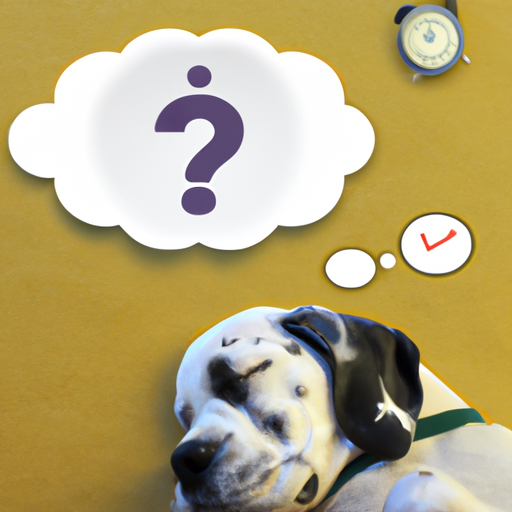As a caregiver, understanding your furry friend’s sleep pattern can offer vital insights into their health and behavior. This guide will delve into the fascinating world of canine sleep and answer the common question, “how much should a 1-year-old dog sleep?”.
Understanding Your Dog’s Sleep Pattern
Just like humans, dogs have a unique sleep pattern. While humans may require a solid eight hours of sleep nightly, dogs have a more flexible sleep schedule. Here are some key points about your dog’s sleep pattern:
- Dogs sleep more than humans but for shorter durations.
- Their sleep cycle includes Rapid Eye Movement (REM) and non-REM phases.
- A dog’s activity level largely determines their sleep needs.
Factors Affecting Your Dog’s Sleep
Several factors can affect how much your 1-year-old dog sleeps:
- Breed: Larger breeds tend to sleep more than smaller breeds.
- Diet: A balanced diet can promote healthier sleep patterns.
- Health: Illness or discomfort can cause changes in sleep patterns.
- Activity Level: Active dogs may require more sleep for recovery.
The Sleep Needs of a 1-Year-Old Dog
Typically, a 1-year-old dog may sleep between 12 to 14 hours per day. However, remember that this can vary based on factors such as breed, health, and activity level.
| Breed Size | Average Sleep Duration |
|---|---|
| Small | 12-14 hours |
| Medium | 14-16 hours |
| Large | 16-18 hours |
Signs Your Dog Might Be Sleeping Too Much
If your 1-year-old dog is sleeping more than the average, it might be a cause for concern. Watch out for signs such as:
- Excessive daytime sleepiness
- Difficulty waking up
- Changes in behavior or mood
- Lack of interest in usual activities
The Role of Activity in Your Dog’s Sleep
A dog’s activity level plays a crucial role in their sleep pattern. Here are a few points to consider:
- Active dogs tend to sleep more due to increased energy expenditure.
- Inactive dogs may sleep more out of boredom.
- Mental stimulation is as important as physical activity to ensure a healthy sleep pattern.
Balancing Sleep and Activity for Your 1-Year-Old Dog
A balanced combination of activity and rest is vital for your dog’s overall health. Here are some tips to ensure a healthy balance:
- Ensure your dog gets enough physical activity during the day.
- Include mental stimulation activities such as puzzle toys or training sessions.
- Establish a consistent sleep schedule.
When to Consult a Vet
If you notice any drastic changes in your dog’s sleep pattern, it might be time to consult a vet. Excessive sleepiness or restlessness can signal underlying health issues that require medical attention.
Frequently Asked Questions
Here are some commonly asked questions about 1-year-old dogs and their sleep patterns:
1. Do all breeds of 1-year-old dogs sleep the same amount?
No, the breed can significantly influence a dog’s sleep pattern. Larger breeds tend to sleep more than smaller breeds.
2. Does diet affect my dog’s sleep?
Yes, diet can influence your dog’s sleep patterns. A balanced diet promotes healthy sleep, while a poor diet can lead to restlessness or excessive sleepiness.
3. Should I be worried if my dog is sleeping more than usual?
If your dog is sleeping more than usual, it’s worth paying attention to. If this change in sleep pattern is accompanied by other behavioral changes, consult a vet.
4. How can I ensure a healthy sleep schedule for my dog?
A healthy sleep schedule can be maintained by ensuring your dog gets sufficient physical activity, mental stimulation, and a consistent sleep routine.
Understanding your dog’s sleep patterns is an integral part of being a responsible and caring pet owner. By observing and understanding these patterns, you can ensure your furry friend gets the rest they need to stay happy and healthy.



